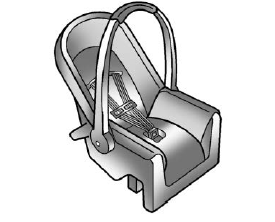Chevrolet Silverado: Airbag System / What Will You See after an Airbag Inflates?
After frontal and seat-mounted side impact airbags inflate, they quickly deflate, so quickly that some people may not even realize the airbags inflated. Roof-rail airbags may still be at least partially inflated for some time after they inflate. Some components of the airbag module may be hot for several minutes. For location of the airbags, see Where Are the Airbags?
The parts of the airbag that come into contact with you may be warm, but not too hot to touch. There may be some smoke and dust coming from the vents in the deflated airbags. Airbag inflation does not prevent the driver from seeing out of the windshield or being able to steer the vehicle, nor does it prevent people from leaving the vehicle.
Warning
When an airbag inflates, there may be dust in the air. This dust could cause breathing problems for people with a history of asthma or other breathing trouble. To avoid this, everyone in the vehicle should get out as soon as it is safe to do so. If you have breathing problems but cannot get out of the vehicle after an airbag inflates, then get fresh air by opening a window or a door. If you experience breathing problems following an airbag deployment, you should seek medical attention.
The vehicle has a feature that may automatically unlock the doors, turn on the interior lamps and hazard warning flashers, and shut off the fuel system after the airbags inflate.
The feature may also activate, without airbag inflation, after an event that exceeds a predetermined threshold. After turning the ignition off and then on again, the fuel system will return to normal operation; the doors can be locked, the interior lamps can be turned off, and the hazard warning flashers can be turned off using the controls for those features. If any of these systems are damaged in the crash they may not operate as normal.
Warning
A crash severe enough to inflate the airbags may have also damaged important functions in the vehicle, such as the fuel system, brake and steering systems, etc. Even if the vehicle appears to be drivable after a moderate crash, there may be concealed damage that could make it difficult to safely operate the vehicle.
Use caution if you should attempt to restart the engine after a crash has occurred.
In many crashes severe enough to inflate the airbag, windshields are broken by vehicle deformation.
Additional windshield breakage may also occur from the front outboard passenger airbag.
- Airbags are designed to inflate only once. After an airbag inflates, you will need some new parts for the airbag system. If you do not get them, the airbag system will not be there to help protect you in another crash. A new system will include airbag modules and possibly other parts. The service manual for the vehicle covers the need to replace other parts.
- The vehicle has a crash sensing and diagnostic module which records information after a crash. See Vehicle Data Recording and Privacy and Event Data Recorders.
- Let only qualified technicians work on the airbag systems. Improper service can mean that an airbag system will not work properly. See your dealer for service.
 How Does an Airbag Restrain?
How Does an Airbag Restrain?
In moderate to severe frontal or near frontal collisions, even belted occupants
can contact the steering wheel or the instrument panel. In
moderate to severe side collisions, even belted occupants can contact the
inside of the vehicle...
 Passenger Sensing System
Passenger Sensing System
The vehicle has a passenger sensing system for the front outboard passenger position.
The passenger airbag status indicator will light on the overhead console when the
vehicle is started...
Other information:
Chevrolet Silverado 2019-2025 Owners Manual: Horn, Windshield Wiper/Washe
To sound the horn, press on the steering wheel. Windshield Wiper/Washer The windshield wiper control is on the turn signal lever. The windshield wipers are controlled by turning the band with on it. With the ignition on or in ACC/ACCESSORY, turn the band to select the wiper speed...
Chevrolet Silverado 2019-2025 Owners Manual: Parking on Hills
Warning To prevent serious injury or death, always park your vehicle and trailer on a level surface when possible. When parking your vehicle and your trailer on a hill: Press the brake pedal, but do not shift into P (Park) yet. Turn the wheels into the curb if facing downhill or into traffic if facing uphill...
Categories
- Manuals Home
- 4th Generation Silverado Owners Manual
- 4th Generation Silverado Service Manual
- Electronic Stability Control (ESC) Off Light
- Electric Parking Brake
- Driver Information Center (DIC) (Base Level)
- New on site
- Most important about car
Child Restraint Systems

Rear-Facing Infant Restraint
A rear-facing child restraint provides restraint with the seating surface against the back of the infant.
